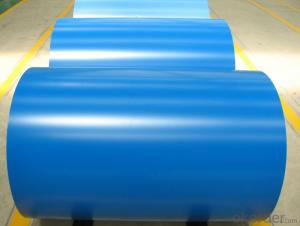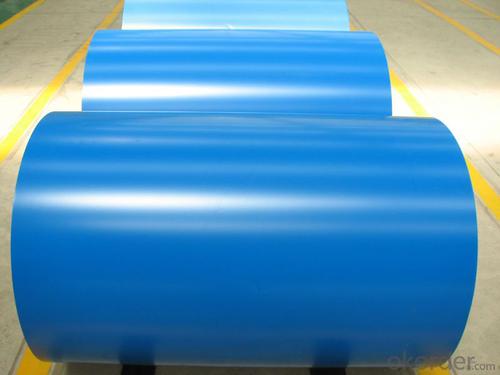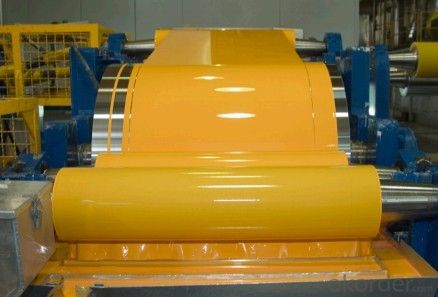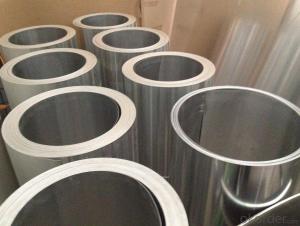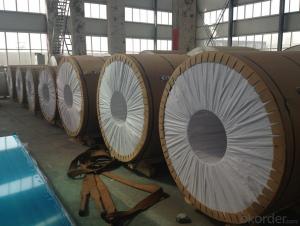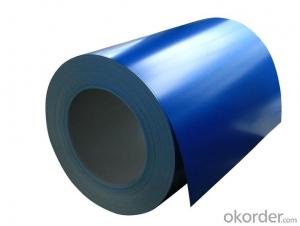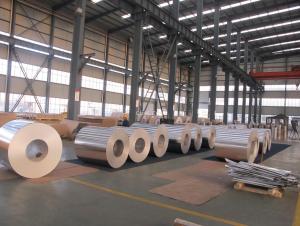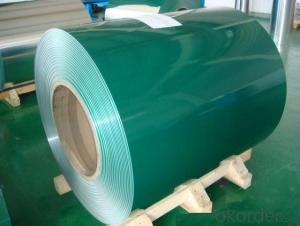Aluminum Coil NJ - PE Prepainted Aluminum Coil for Gutters
- Loading Port:
- Shanghai
- Payment Terms:
- TT OR LC
- Min Order Qty:
- 5 m.t.
- Supply Capability:
- 1000 m.t./month
OKorder Service Pledge
OKorder Financial Service
You Might Also Like
Specification
1. Structure of PE Prepainted Aluminium Coil for Gutters
PE Prepainted Aluminium Coil for Outdoor Gutters is one semi-finished aluminium material. This coil can be rolled down to aluminium coil,sheet,circle ect. The alloy AA1050 is widly used in building, industry ect. Its weight is much lower than steel. So many customers choosed aluminium material instead of steel.
2. Specification of PE Prepainted Aluminium Coil for Gutters
Aluminum Coil/Sheet | |
Main Specification | |
Alloy | AA1xxx (AA1050, AA1060, AA1070, AA1100 etc.) |
AA3xxx (AA3003, AA3004, AA3005, AA3105 etc.) | |
AA5xxx, AA6XXX (AA5052,AA5083, AA5754, AA6061, AA6062 etc.) | |
AA8xxx(AA8011, AA8006 etc.) | |
Temper | H14,H16, H18, H22, H24, H26, H32,O/F, T4, T6, T651 |
Thickmess | 0.01mm-100mm |
Width | 30mm-1700mm |
Standard | GB/T 3880-2006/ASTM |
Special specification is available on customer's requirement | |
3. Application of PE Prepainted Aluminium Coil for Gutters
(1).Interior: wall cladding, ceilings, bathrooms, kitchens and balconies, shutters, doors...
(2).Exterior: wall cladding, facades, roofing, canopies, tunnels,column covers , renovations...
(3).Advertisement: display platforms, signboards, fascia, shop fronts...
4. Feature of PE Prepainted Aluminium Coil for Gutters
Surfact Quality :
Be free from Oil Stain, Dent, Inclusion, Scratches, Stain, Oxide Dicoloration, Breaks, Corrosion, Roll Marks, Dirt Streaks and other defect which will interfere with use,
Mechenical Property:
Chemical Composite and Mechanical Property
5. Certificate of PE Prepainted Aluminium Coil for Gutters
SGS and ROHS(if client request, paid by client), MTC(plant provided), Certificate of Origin(FORM A, FORM E, CO), Bureau Veritas and SGS (if client request, paid by client), CIQS certificate
6. Image of PE Prepainted Aluminium Coil for Gutters
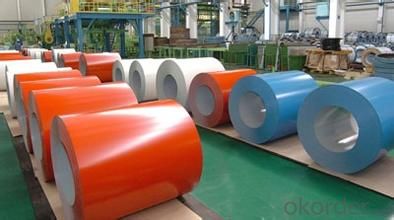
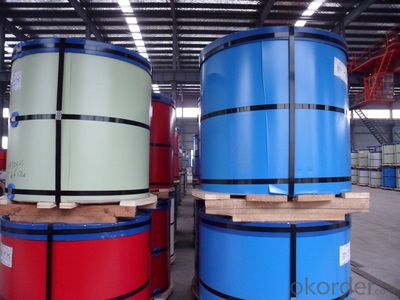
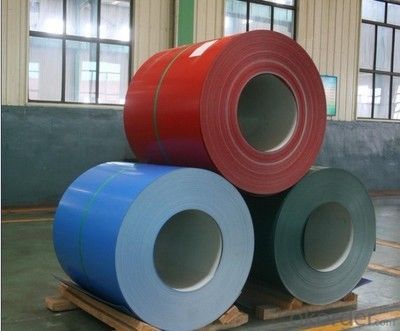
7. Package and shipping of PE Prepainted Aluminium Coil for Gutters
First, plastic cloth with drying agent inside; Second, Pearl Wool ; Third, wooden cases with dry agent , fumigation wooden pallets, aluminum surface could cover blue PVC film
8. FAQ
1) What is the delivery time?
Depends on actual order, around 20 to 35 days
2) What is the QC system:
We have QC staff of 20 persons and advanced equipment, each production is with MTC traced from Aluminum ingot lot.
3) What market do you mainly sell to?
Australia, America, Asia, Middle East, Western Europe, Africa etc
- Q: Other than alloys. I'm trying to think of a way I can make an aluminum knife that will hold an edge. One group of researches say they used 60 metric tons of force to realign the molecular structure and give the metal strength equal to steel. I don't have a 60 ton press aha. Would heat treatment plus 10 tons of pressure repeated have a similar affect?
- No. You would have to use the exact procedure or use alloys.
- Q: my text says aluminium does not corrode much as a passive aluminium oxide layer is formed on it.Well other metals such as sodium adn potassium also form oxides. Why dont their oxides prevent further oxidation ?
- sodium oxide and potassium oxide are water soluble aluminium oxide is not water soluble. the layer formed of oxide on the aluminium surface is coherent and adherent with no pores and stuck to the metal surface. the layer is also passive to most acids and alkalies except HCl and anti passive ions if present. sodium oxide and potassium oxide dissolve in any aqueous medium forming the corresponding alkalies NaOH and KOH leaving the fresh metal surface exposed to more corrosion. also the reaction of Na and K with aqueous media like water and acids is quite vigorous and fast unlike aluminium which is mu less reactive
- Q: What are the different joining methods for aluminum coils?
- Some of the different joining methods for aluminum coils include welding, soldering, brazing, and mechanical fastening.
- Q: Is it possible to use aluminum coil as a material for crafting jewelry?
- <p>Yes, you can use aluminum coil to make jewelry. Aluminum is lightweight, affordable, and easy to work with, making it a popular choice for crafting. It's also hypoallergenic, which is a plus for those with metal sensitivities. However, it's softer than metals like sterling silver or gold, so it may require more care to prevent denting or bending. Aluminum can be shaped, cut, and polished to create various jewelry designs, but it may not hold up as well over time or under heavy use compared to harder metals.</p>
- Q: Are aluminum coils resistant to UV rays?
- Yes, aluminum coils are generally resistant to UV rays. Aluminum is a non-reactive metal, which means it does not easily corrode or react with other substances. This resistance to corrosion extends to UV rays as well. UV rays are a form of radiation emitted by the sun, and they can cause damage to various materials over time, including fading, discoloration, and degradation. However, aluminum is known for its ability to withstand UV rays without significant damage. This makes aluminum coils a suitable choice for outdoor applications where exposure to sunlight and UV rays is a concern, such as in air conditioning systems, refrigeration units, and solar panels. Additionally, aluminum coils can also be coated with protective finishes or paints to further enhance their resistance to UV rays and extend their lifespan.
- Q: How are aluminum coils used in insulation applications?
- Aluminum coils are commonly used in insulation applications due to their excellent thermal conductivity and durability. They are typically used as a component of HVAC systems, where they are used to transfer heat between the air and the refrigerant in order to control the temperature of a space. In insulation applications, aluminum coils are often used in the production of air conditioning units, heat pumps, and refrigeration systems. These coils are designed to efficiently transfer heat, allowing for the effective cooling or heating of a space. The coils are typically made of aluminum due to its high thermal conductivity, which enables the efficient transfer of heat. Additionally, aluminum is lightweight and corrosion-resistant, making it a suitable choice for applications that require durability and longevity. Aluminum coils are commonly used in conjunction with other insulation materials such as foam or fiberglass to create a thermal barrier. This combination helps to minimize heat transfer between the inside and outside of a building, reducing energy consumption and improving overall energy efficiency. Furthermore, aluminum coils can be easily formed into various shapes and sizes, allowing for customization and flexibility in insulation applications. This versatility makes them suitable for a wide range of insulation needs, from residential to commercial and industrial settings. In summary, aluminum coils play a crucial role in insulation applications by efficiently transferring heat and contributing to energy efficiency. Their thermal conductivity, durability, and versatility make them an ideal choice for various insulation needs, helping to create comfortable and energy-efficient environments.
- Q: Can aluminum coils be used in high-pressure applications?
- No, aluminum coils are not typically used in high-pressure applications due to their lower strength and less resistance to deformation compared to other materials such as steel.
- Q: How do aluminum coils perform in corrosive environments?
- Aluminum coils perform exceptionally well in corrosive environments due to their inherent properties and protective coatings. Aluminum has a natural oxide layer that forms on its surface when exposed to air, creating a protective barrier against corrosion. This oxide layer is highly resistant to many corrosive agents, such as saltwater, acids, and atmospheric pollutants. Additionally, aluminum coils can be further protected with various coatings and treatments to enhance their resistance to corrosion. These coatings can include organic coatings, such as paint or lacquer, or inorganic coatings like anodizing or chemical conversion coatings. The combination of aluminum's natural oxide layer and additional protective coatings makes aluminum coils highly durable and reliable in corrosive environments. This resistance to corrosion is particularly beneficial in industries such as marine, chemical processing, and coastal applications, where exposure to saltwater or aggressive chemicals is common. Moreover, aluminum coils are lightweight, which adds to their versatility and ease of installation, making them suitable for a wide range of corrosive environments. This lightweight property also contributes to reducing transportation costs and energy consumption during installation. In summary, aluminum coils are well-suited for corrosive environments due to their natural corrosion resistance and the availability of protective coatings. Their durability, lightweight nature, and resistance to corrosion make them an optimal choice for various industries and applications, where longevity and performance are crucial factors.
- Q: Are aluminum coils suitable for electrical transformers?
- Yes, aluminum coils are suitable for electrical transformers. Aluminum is a lightweight and cost-effective material that offers several advantages for transformer construction. It has excellent electrical conductivity, comparable to copper, which allows for efficient power transfer. Additionally, aluminum coils have lower resistance than copper coils, resulting in reduced power losses and improved energy efficiency. The use of aluminum coils in transformers also contributes to weight reduction, making them easier to handle and transport. However, aluminum coils require larger cross-sections compared to copper coils due to their slightly lower conductivity. This means that transformers using aluminum coils may be slightly larger in size. Overall, aluminum coils are a viable and widely used alternative to copper coils in electrical transformers, offering cost savings, high conductivity, and improved energy efficiency.
- Q: What are the necessary safety measures to be taken while handling and using aluminum coils?
- <p>When using aluminum coil, safety precautions include wearing appropriate personal protective equipment such as gloves and safety glasses to prevent cuts and eye injuries. Ensure good ventilation to avoid inhaling aluminum dust or fumes. Keep the work area clean and free from clutter to prevent tripping hazards. Use proper tools to handle the coils to avoid strain or injury. Be cautious of electrical hazards if the aluminum coil is being used in conjunction with electrical equipment. Always follow the manufacturer's guidelines for safe operation and storage of aluminum coils.</p>
Send your message to us
Aluminum Coil NJ - PE Prepainted Aluminum Coil for Gutters
- Loading Port:
- Shanghai
- Payment Terms:
- TT OR LC
- Min Order Qty:
- 5 m.t.
- Supply Capability:
- 1000 m.t./month
OKorder Service Pledge
OKorder Financial Service
Similar products
Hot products
Hot Searches
Related keywords
